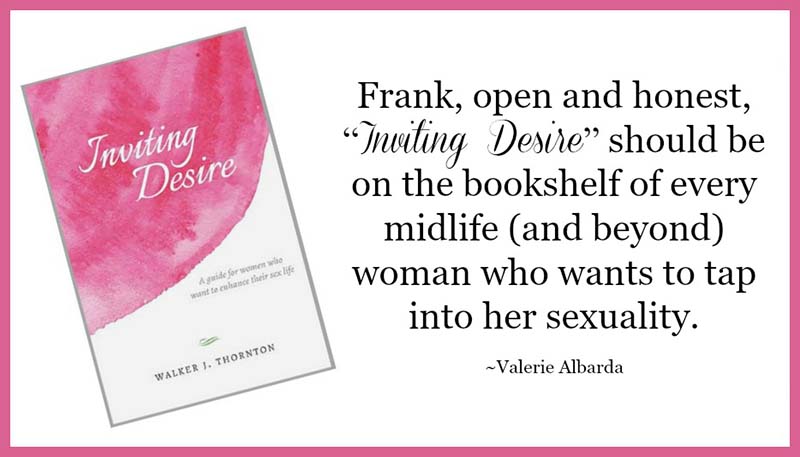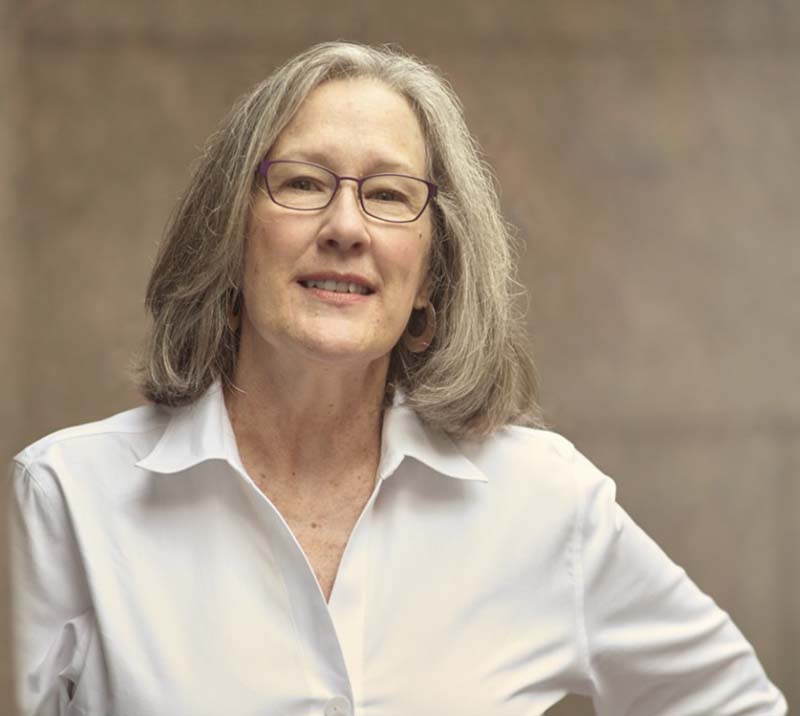Thanks you to Walker Thornton – Author & Public Speaker for agreeing to participate in this weeks VIP Interview. Walker has a book, Inviting Desire: A guide for women who want to enhance their sex life. The book celebrates getting in touch with yourself for a sexier you, post-midlife. It does this through the exploration and teachings of self-awareness of your body and the embracing of your own sexuality.
Walker’s writings and sexual education focuses on older women, which I think is absolutely amazing. Society often overlooks the sexual desires of older individuals, assuming they diminish with age, despite life changes. Let’s dive into this week’s interview with Walker Thornton.
VIP Interview With Walker Thornton – Author & Public Speaker!
How important is it, and why is it important, to talk about sex and sexuality post Mid Life?
I think it’s vital that we have the voice of older people talking about sex and sexuality. It’s important that we assist younger adults in confronting ageist assumptions about sex. Many women in their 50s and older have long-standing struggles with sexuality, especially during and after menopause. Because of that there is a need for education and information specifically written for that specific demographic.
You have your own blog, and are active on the public speaking circuit. Did you see yourself as becoming a sex educator and how did you transition in public speaking, and sexual health and education?
Yes, I see myself as an educator, a resource and a cross between mentor and coach. While in the violence against women field, I documented my post-divorce dating experiences, shedding light on adult sexuality education gaps.
I redirected my writing to fill gaps in resources for older women, advocating at sexuality conferences for expanded sex education.Online websites began contacting me to write about midlife sexuality for their e-zines and it bloomed from there.
As someone that was married for over twenty years and having gone through a divorce and started dating again, has the dating game changed, and what advice would you give to people that are dating later in life, might feel that the dating game has changed or even decided to put it in the ‘too hard basket’?
I would advice people to take it slow, first of all. Far too many people rush to find a replacement after divorce or the death of a spouse. I think women need more time to sort out what they want to do next—because we have so many options and being partnered isn’t necessarily the only, or best, option. When I teach dating workshops I suggest making a list of what you’re looking for. Clarity about desires guides us in starting our search, knowing whom to seek and whom to avoid.
The dating game has changed and for those of us over 50 it can be a little awkward. Is it hard? Yes. And that also fluctuates depending on your expectations. If people start out looking to meet new friends rather than having a very narrow, set agenda they are likely to have more fun. Some of us may want to spend a period of time alone—but many of us are still ready for fun and sex and romance. Seeing things as “too hard” often stems from misleading ads claiming quick romantic success. While that may happen it is not the norm.
What’s the go to comfort food for Walker Thornton?
Well, right now I’m eating Ben and Jerry’s Cherry Garcia out of the carton while I answer questions. If I’m being a bit more sophisticated it might be risotto. Or maybe I’d just put the ice cream in a lovely pottery bowl.

A lot of bloggers writing about their sex life, dating, and relationships suffer from burnouts as a result of putting so much of themselves out there. Blogs are often candid, emotional, raw and expose a certain vulnerability. How do you keep yourself mentally healthy and have you experienced burnout / how did you overcome burning out?’
There’s a lot of vulnerability in sharing personal information. I had to decide what I was willing to share with a public audience and as a result I don’t share my sexual experiences in any detail. I think about what my audience needs and wants to hear and tend to write to them. Considering this, I determine whether my writing will genuinely benefit others or if it’s merely self-expression. I write for a middle-of-the road 45-65 year old heterosexual woman and I know that.
Interestingly enough many of my newsletter subscribers and FB followers are middle-aged men. My daily journal is where I’m most likely to write more private details. When someone seeks more than just titillation, I opt for private conversations. The lack of personal content prevents burnout.
I think I’m not really a sex blogger in that regard. My writing is a mix of education, personal story and resources. I also write on topics that are not about sex but relevant for older women trying to change their lives.
You have openly stated that you grew up in an era where women didn’t learn about sex, or their bodies. Do you feel that that is changing, and are we missing the mark on some points?
Things are definitely changing. I gave my sons comprehensive information about sex and we actually talked, some, about dating and having sex. And while sex education has changed, we’re still not incorporating the idea of pleasure in instructional programming. I think women need to be taught about their bodies’ capacity for pleasure as a basis for understanding that sex is a mutual experience, a give and take.
The prevalent information in sex education, mainstream film and TV is the good old standard, male focused penetrative sex: intercourse. Sex is defined as penetrative sex where men almost always have a climax and far fewer women will report an orgasm. We rarely talk about putting a woman’s pleasure first, or illustrating the clitoris and how women can orgasm.
I wonder how many men realize the majority of women do not orgasm from intercourse at all? That women need clitoral stimulation? And that their desire to please a woman has to translate to understanding female anatomy and specifically the wants and needs of the woman they are with.
As people age, their body is no longer the same as what it was in their early twenties. What would your advice be to people looking to still have an active and healthy sex life as they age?
For one, continued sexual activity is vital to the sexual health of all of us. The same old “use it or lose it” adage we apply in other areas. My most popular talk is called, Sex After 50? Yes Yes Yes. I talk about the need to expand one’s definition of sex. At some point for many adults, penis-in-vagina sex isn’t going to be the sure thing it was in our 20s. Plus, (see last question) since most women don’t climax during intercourse, why not learn to find pleasure in ways that are mutually satisfying to both partners?
When we expand the range of ways we can climax then we expand our time spent in intimate play, increase pleasure and receive all the other benefits of being sexually intimate. This means that with chronic illness, erectile dysfunction, mobility issues and more we can still give and receive pleasure.
And it’s important for people to know that there are plenty of 70 year-olds out there who have oral sex, give blowjobs, try new positions, have multiple lovers and enjoy kink.
“Real intimacy is a dance between two people”. I love this quote, and I find that it speaks directly to the heart. What does this quote mean to you, and how important is it for people to understand?
Thank you, it’s an experience I’ve had just enough to know it is our most desired way of experiencing sexual intimacy. My best sexual experiences are those where I connect with my partner and we’re both aware of our mutual desire for pleasure. A dance has to have 2 active partners—it’s a give and take.
Sex is no different. We learn by listening or sensing another’s body, we adjust accordingly and we flow together. There are plenty of men out there, of all ages, who consider sex as “sticking it in” and getting off. They don’t understand the importance of mutuality, nor do they understand the power of two people equally engaged and actively participating.
When it comes to sex and aging – what’s the three most important things that you’d like people to know and remember?
As long as we’re still breathing we can have sex if we want it.
Women have a right to pleasure. To seek it when they want it and to have a full, vocal say in when and how and what they want.
There are so many benefits to sex—cognitive, emotional and physical—that we should try harder to keep sexual connections in our lives.
Do you have any advice for people who are getting ready to have sex again for the first time in a long while?
Talk about it, before you get into the bedroom, while you’re both fully dressed. If you think that feels too personal then maybe you’re not ready to have sex. It is pretty personal; so is getting naked with a new person. Talking about sex can be arousing and it helps to break the ice. You get to share what turns you on, or your concerns. Ask questions. And it gives you a chance to see what this new partner feels about sex. Are they listening? Do they respect your wishes? Be clear that both of you want the same things.
Talk about protection from sexually transmitted infections. Make sure a partner agrees to use a condom, or to wait for STI test results is done before you have sex.
Have sex whenever you want—first date, tenth date—just make sure you are both clear as to what it means for you. Is this just casual sex or is one of you thinking that having sex means there’s a significant relationship starting? Do something because you want it and make sure you won’t have negative feeling when it’s all over.
Any final advice you want to share for people looking to start their own blogs?
I would urge anyone who wants to blog to think about their audience and their goal in blogging. There’s a different between simply sharing an online journal and trying to write to a specific audience. A little planning is a good idea.
I think women in particular need to be aware of the challenges of putting themselves and their lives out in the public. I don’t get trolls but I know many women do and it’s hard to deal with the backlash and negativity that people feel entitled to throw out at women.
Thanks so much for your time – I think it’s really valuable for people to talk about sex and sexual health regardless of age and I absolutely applaud the work that you do in this arena.
Walker Thornton Website

Meet Stephen, a bold and opinionated cis-gendered gay advocate for gender equality and sexual education. Join him on the Adultsmart blog for fearless insights.








Leave a Reply